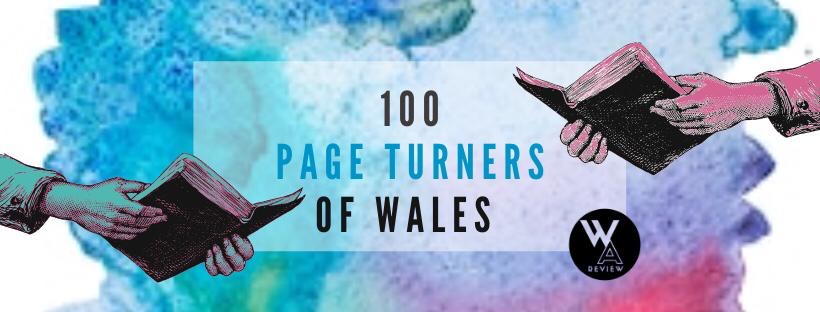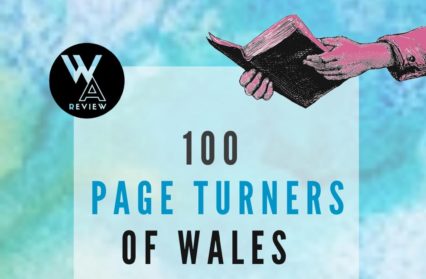Emma Schofield introduces a new series from Wales Arts Review looking at a 100 page turners of Wales, a vast exploration of Welsh fiction that uses the BBC’s recent “Novels That Shaped Our World” as a springboard to argue that Wales’s rich and exciting literary output over the eras has produced a long list of exciting, engaging, and thrilling reads.
Cast your mind back to the pre-pandemic era of November 2019 and you may well recall meals with family and friends, trips to the pub, or the shops and a time when wearing a face mask in public would likely have resulted in suspicious glances from passers-by. In the midst of the normality, in November 2019, the BBC unveiled its list of one hundred page-turners, grandly subtitled ‘The Novels That Shaped Our World’. The list took the form of a new project designed to get everyone talking about the English language books which meant the most to them, with discussions and features planned to run across the coming year. There were, of course, some excellent titles on that list, but, troublingly, of those one hundred books only one entry was by a Welsh author. I wrote about this puzzling development at the time, querying why the only Welsh contribution to the BBC’s list of 100 page-turners was via a children’s book authored by someone who spent the majority of his life living outside of Wales. As excellent as Roald Dahl’s The Witches no doubt is, it seemed peculiar that this single book constituted the only Welsh representation in a list of one hundred titles.
Global events have, naturally, overtaken things in recent months, but as surveys reveal that more and more people are turning to reading to ease them through uncertain times, now seems like an ideal time to explore the Welsh titles which have shaped each of our lives. To start that conversation, Wales Arts Review has brought together a panel of experts to nominate fiction titles by Welsh writers which they felt were their page-turners. The list is not definitive, nor is it meant to be exhaustive; it is a starting point for what we hope will be a rich discussion about the fiction from Wales which matters to us.
The BBC’s list divided titles into ten different categories, each containing ten nominations and we’ve decided to adhere to those categories for this uniquely Welsh list. Over the coming months we’ll be publishing a new category every fortnight, listing the ten books which our panel suggested as their Welsh page-turners. Each list will be accompanied by suggested resources for the books which have been nominated. Whittling choices down to just one hundred books was not easy, but the titles which have made it on to the list all meant something to our panel. Arguably, categories can create arbitrary divisions which do not really exist; in drawing this project together it quickly became clear that a book nominated by one panellist would often also appear in another panellist’s nominations for an entirely different category. Assigning books to just one category is, of course, problematic, but for the purposes of responding to the BBC’s original list, the nominations here have been kept within those ten categories.
For the first category, Coming of Age, (published here) we have a list of ten books exploring themes relating to the formative years of our lives. The titles in this category span an impressive sixty-six years, taking us across the length and breadth of Wales with their powerful evocations of characters growing up and searching for their place within the world.
As the Covid-19 pandemic enters another month and the realities of living with the virus become ever present in the world around us, discussion of the importance of the arts has rightly moved to the fore. Now, more than ever, we need to keep that momentum going and remind ourselves of exactly what is so special about the arts in Wales and our literature is an inherent part of that. Read the list, agree with it, disagree with it, add your own favourites, tell us about the books from Wales which matter to you, but keep that discussion going so that the books from Wales which have shaped us are not overlooked.

100 Page Turners of Wales: Categories
Emma Schofield introduces the first of our categories for the 100 Page Turners of Wales, Wales Arts Review’s exploration of the riches of Welsh fiction.
In the second category, Emma Schofield explores the Rule Breakers in our nation’s literature.
Emma Schofield introduces the next category in our list of 100 Page Turners of Wales.
In the latest instalment of our 100 Page Turners from Wales series, Emma Schofield introduces a selection of titles with the theme of ‘Family and Friends’.
Emma Schofield introduces our panel’s selection of titles with the theme of ‘Romance’.
Emma Schofield takes a look at the question of ‘Identity’ for the next categories in our 100 Page Turners of Wales series.
Emma Schofield introduces the category of ‘Life, Death and Other Worlds’ in the next instalment of our 100 Page Turners of Wales series.
Emma Schofield takes a closer look at the books chosen by our judging panel in the ‘Politics’ category.
Emma Schofield reflects on the books chosen by our judging panel in the ‘Class and Society’ category.
In the final instalment of our 100 Page Turners from Wales series, Emma Schofield introduces our panel’s selection of titles with the theme of ‘Conflict and Crime’.
100 Page Turners of Wales – A Round-up
As we reach the close of the year, Emma Schofield takes a reflective look back at our 100 Page Turners of Wales series.
The Judging Panel
Dr Aidan Byrne is a lecturer in English Literature and Cultural Studies at the University of Wolverhampton. Having completed a PhD in 2008 on masculinity and extreme politics in interwar fiction from Wales, Aidan has gone on to publish widely on writing from Wales. Aidan is a co-founder of the Wolverhampton Literature Festival and is the Secretary of the Association for Welsh Writing in English.
Darren Chetty is a Swansea-born writer, teacher and researcher with an interest in exploring philosophy, education, racism, children’s literature and hip-hop culture. Darren is currently a Teaching Fellow at UCL and, alongside Jeffrey Boakye, is the co-author of What is Masculinity? Why Does it Matter? Darren has also contributed to a number of publications including the bestseller, The Good Immigrant, edited by Nikesh Shukla.
Mel Griffin has run independent bookshop Griffin Books (formerly known as the Windsor Bookshop) in Penarth since 2014. Before becoming owner of the bookshop, Mel enjoyed a successful career in IT for a global company, but describes running Griffin Books as a dream come true. Nominations from Mel arose from discussions with the dedicated team who help her to run the bookshop.
Dr Emma Schofield is an Associate Editor for Wales Arts Review and completed a PhD exploring the impact of devolution on literature from Wales at Cardiff University in 2015. She has taught broadly on Anglophone Welsh writing and contemporary women’s writing and is particularly interested in the connections between politics, culture and identity in contemporary Wales. In her spare time Emma enjoys writing and has contributed to radio and podcast discussions about Welsh culture having taken part in the BBC’s New Generation Thinkers scheme in 2016.
Dr Lisa Sheppard secured a PhD from the Schools of Welsh and of English, Communication and Philosophy at Cardiff University in 2016. Her PhD explored representations of multiculturalism in writing from Wales and she went on to work as a lecturer and research associate within the School of Welsh. A monograph arising from Lisa’s PhD thesis, Y Gymru `Ddu’ a’r Ddalen `Wen’: Aralledd ac Amlddiwylliannedd mewn Ffuglen Gymreig, er 1990, was published in 2018 and was shortlisted for the Welsh language Creative Non-Fiction Award in the 2019 Wales Book of Year Awards.
Lleucu Siencyn is Executive Chair of Literature Wales and has a particular interest in developing engagement among children and young people, bilingualism and diversity, and opportunities for writer development and innovation. Lleucu also writes for Wales Online and The Western Mail.
Professor Diana Wallace is based at the University of South Wales where her research centres primarily on women’s writing, with special interests in historical fiction, Welsh writing in English, Modernism and the Gothic. She is Co-Director of the Centre for Gender Studies in Wales and has published broadly on the subjects of women’s writing and literature from Wales. Diana is also a Co-Editor of The International Journal of Welsh Writing in English.
(100 Page Turners of Wales Artwork created by Lilly Dosanjh)












